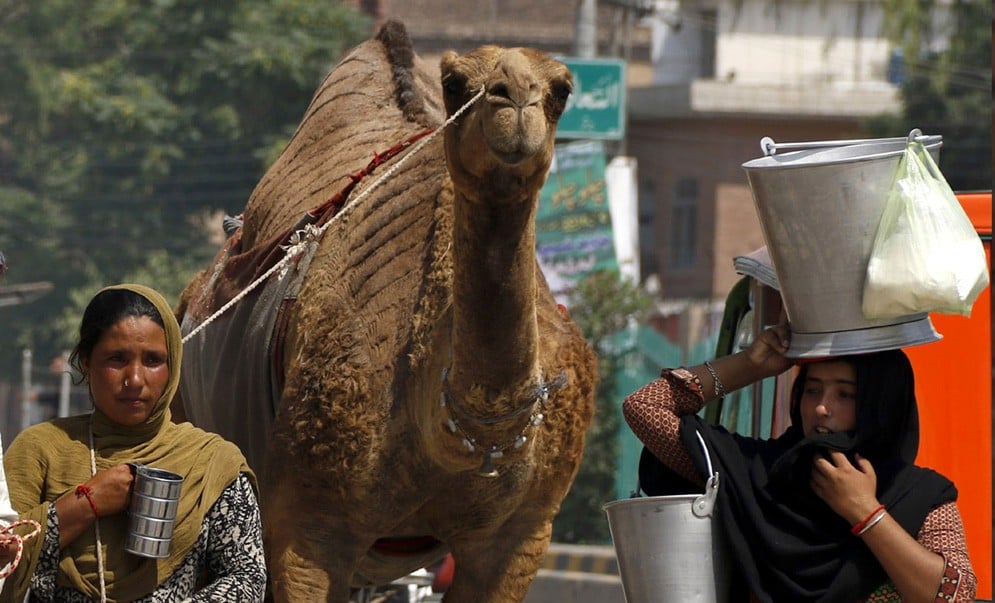
The hopes and dreams of a community subsisting on society’s margins

Gypsy women roaming around the streets of Peshawar with their camels and milk buckets has been a familiar sight for city dwellers for a while now.
While passing through the ring road towards the southern side of the city, you will come across the tented settlements sprawling over a vast area of land where these nomads live and rear livestock. If you take the GT Road, it will be at a few minutes’ drive from Peer Zakori Sharif Flyover.
Peshawar is a plain that witnesses severe weather conditions, be it summer or winter. This winter the city experienced more than usual cold, so much so that the provincial government had to extend the winter vacations for schools. Can you imagine living under the open sky in a tent amid intermittent showers and dropping mercury in such conditions?
Settled over privately-owned land, this tented village houses almost 32 families, a majority of them from Sindh and Punjab.
A man named Gulbahar heads this ‘tribe’ as he is the only one among the Sindhi families who knows Urdu. Others speak Balochi as they are ethnically Baloch. Back in their hometown, their community resides in Kashmore district of Sindh.
Gulbahar is in his early 40s. Delighted to have a journalist as his guest, he makes me sit on a charpoy while he himself sits on the ground in front of it. "Guests are a blessing of Allah," he says while sitting on the ground, surrounded by a group of children who had gathered around us out of curiosity.
"You must have a cup of tea with us. We make it by burning twigs. If you don’t like it this way, I could get you some from the hotel," he insisted.
He says they have been living here for the last four years. They spend winters here and go back to their home town in the summers where they work in rice paddies. As they don’t have work in their native town in the winters, they come here in Peshawar. Here he works on daily wages and earns almost 500 to 600 rupees daily to support his seven-member family: five children and a wife.
"This is my country and I can earn a living in any of its parts. Look for how long Afghan refugees kept living and running their businesses here, then why should not we? We are the citizens of this country," says Gulbahar passionately when asked why their community prefers to live here in tents while they own mudhouses back in their hometown.
"People have a misconception about us that we beg, but all the families inhabiting the settlement here earn a living for themselves. Our women take care of children at homes while the men go out to earn. If someone wants to help us, we accept it happily and appreciate it but we don’t ask for help ourselves," he goes on.
According to him, the land is owned by a person who has permitted them to live here without any rent and has even built a tubewell there to cater to their drinking water needs.
A non-governmental organisation TARS (Timely Aid and Relief Support) keeps helping them with eatables and clothes. It has arranged a qari (religious teacher) for their children to make them read the Holy Quran. It sends a doctor there as well whenever any of them falls ill.
Although he is not literate, Gulbahar wishes to educate his children, and he is lucky that they are taught for free by a lady teacher who lives nearby.
He is proud to say that his sons can read the English alphabet, as soon as he tells me this he asks his five-year-old son Ghaffar to read what is written on a candy wrapper lying there on the ground. "If I stay alive, I will make him join the Pakistan Army Inshaallah," he says determinedly.
At the entrance of the tented village, five camels are grazing on cauliflower stalks while their three calves are taking a nap nearby. There in the first tent is a lady making chapatis for her family on a twig-fire. A Chihuahua is kept on a leash near the tent. Looking at me walking towards the tent, the tiny vigilant creature starts barking and straining at its leash.
The young mother of four talks to me while her daughter plays near the charpoy. At the back of that charpoy lies an LED that is connected with a solar panel lying outside of the tent. "This is for my children to watch TV when they insist," she explains.
"We are three inter-related families living here. Each family owns a camel. Others from my in-laws live in tented settlements in Rawalpindi while my mother owns a house in Sheikhupura. I visit her whenever I miss her," she says.
"We are also human beings. We also suffer and are affected by the weather conditions, be it sizzling summer or harsh winters. There are those who are filthy rich and those who have nothing. This is what life is all about. After all you have to go under the soil," she says pointing to the soil.